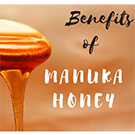Why manuka honey is set to supercharge our lives
It has celebrity endorsement and is readily available in shops – but what is manuka honey?
Manuka honey is cultivated from nectar collected by bees that forage on the wild manuka tree which grows in New Zealand and also in Australia. The origins of the word ‘manuka’ are Maori, the native language of New Zealand – leading to controversy over how the honey should be labelled in both countries.
What to look out for
When buying manuca honey look out for the Unique Manuka Factor (UMF) grading. It means it has been sourced in New Zealand and meets strict government standards. Look out for a number such as 10+ or 25+, which represents the level of unique signature compounds present in that specific honey – this is what gives the honey its purity and quality. The higher the rating the more pure – and expensive – the honey will be.
Health benefits
New Zealand biochemist Peter Molan famously discovered the exceptional antibacterial activity of manuka honey in 1982. Although research is still in its infancy many scientists are in agreement as to the health claims associated with manuka honey.
It boasts a number of has antibacterial, antiviral and anti-inflammatory properties that can help treat numerous ailments including sore throats and wound healing.
Manuka honey has also been shown to have cosmetic benefits such as helping skin retain moisture and helping to combat inflammatory skin conditions.
Research also suggests that manuka honey has the ability to help with various digestive disorders while adding a dollop to your herbal tea can also help you sleep.
Why so expensive?
Celebrity endorsements from Gwyneth Paltrow and Victoria Beckham mean manuka honey has become a global trendy superfood. The higher cost of manuka honey comes down to strong global demand and limited supply. As more people are becoming aware of the honey’s health benefits its demand is set to soar – along with the price.




